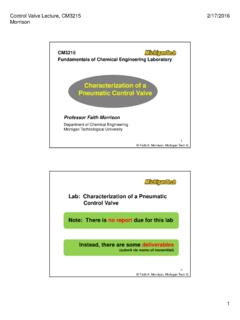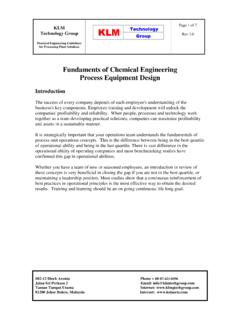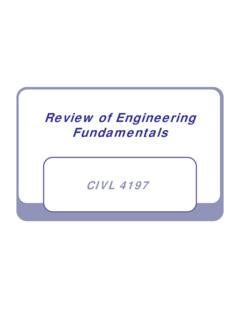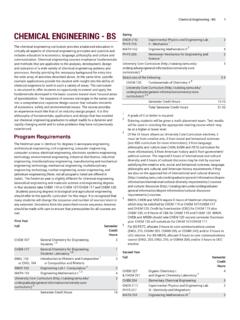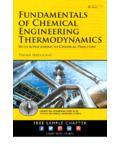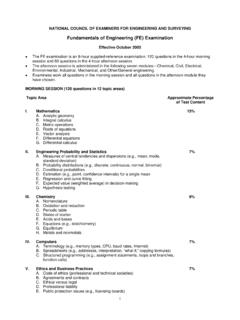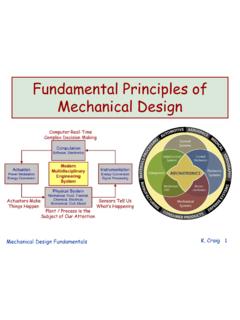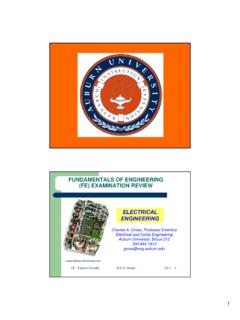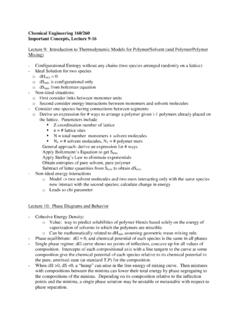Transcription of Fundamentals of Engineering Program
1 Fundamentals of Engineering Program 1 Fundamentals of Engineering ProgramE-mail: of ProgramThe Benjamin M. Statler College of Engineering and Mineral Resources Fundamentals of Engineering Program (FEP) is designed to support beginningengineering students as they build foundational Engineering skills and discern their career interests within the field of Engineering . The mission of thisstudent-oriented Program is to advise, prepare, and retain qualified students for degree programs in the Statler College. More specifically, the FEPprovides the academic and co-curricular support students need for success in their: transition to college life; development of academic discipline andskills needed to succeed as an Engineering student; foundational courses (Mathematics, Chemistry, Physics, and basic Engineering ); and selection of aComputer Science, Biometric Systems, or Engineering discipline ObjectivesThe FEP uses both curricular and co-curricular programmatic elements to meet its educational objectives.
2 Students who successfully complete therequirements of the WVU Fundamentals of Engineering Program : Apply their knowledge of mathematics, science, and Engineering , as well as problem-solving techniques, to define, formulate, and solve engineeringproblems. Use Word , Excel , Power Point , and MATLAB as Engineering tools to perform computations, analyze and plot data, and model a simple systemas part of solving an Engineering problem. Communicate effectively, orally, in writing, and with the use of technical tools such as Microsoft Word , Excel , Power Point , and MATLAB toanalyze, report, and present data. Work collaboratively on a team.
3 Demonstrate their understanding of professional and ethical responsibility by applying ethical principles and professional standards to makingengineering decisions. Demonstrate an understanding of the impact of Engineering solutions and actions in a global, economic, environmental, and societal context. Demonstrate the academic maturity and skills necessary to manage their time and use available resources, as necessary, to succeed in theircoursework and to engage in life-long learning. Identify ways to become involved in and engaged with the Statler College community. Select a major that fits with their career FEP focuses on: (1) careful advising and accurate placement of students into courses that are at an appropriate level to facilitate academic success;(2) communication between students, faculty, advisors, and parents; (3) academic support services to help students in the fundamental math, scienceand Engineering courses; (4) provision of a co-curricular and social environment that facilitates successful transition to the college environment, providescareer exploration opportunities, and supports students academic endeavors; and (5) quality and engaging fundamental Engineering instruction.
4 The FEP provides a vibrant and supportive community for beginning Engineering students centered in the Engineering Learning Center (ELC). Freshmen have a one-stop place to get the answers they need as they navigate through the transition from high school to college. In the ELC,students receive free tutoring, find information about upcoming guest speakers and other College events, get advising questions answered, and spend asignificant amount of time studying, doing homework, and working on team projects for their Engineering classes. Academic support is provided to all FEP students in the following subjects: Math, Chemistry, Physics, and Engineering .
5 Academic support takes severalforms: special Engineering sections of MATH 155, Calculus I, with two problem-solving recitations each week; free tutoring available at the ELC, theMath Learning Center, the Chemistry Learning Center, and other campus learning centers; special review sessions for math, chemistry, physics, andengineering courses hosted by the ELC; and support from faculty who care about their students learning and who are willing to meet with studentsduring office hours and in the ELC. All students taking any 100-level ENGR course must spend two hours each week studying, working on homework orclass assignments in an approved and supervised environment that provides tutoring support services.
6 To facilitate engagement with the Engineering community and development as Engineering professionals, FEP students are required to participate inand reflect upon Engineering -related Out of Class Experiences (OCEs). Typical OCE opportunities include: EngineerFEST, an Engineering studentorganization fair held at the beginning of the year to encourage students to learn about and become involved in one of the College s many studentchapters of the professional Engineering societies; Department Visitations, in which each department hosts freshmen in an informational seminardescribing their majors, relevant research opportunities, and the career paths of graduates; and Student Success Seminars where students learnacademic skills and strategies that promote success in Engineering disciplines.
7 All policies, procedures, upcoming events and activities, and academic resources are listed on the FEP website. All of these efforts, academic and co-curricular, work together to create a coherent Program designed to facilitate student success in Engineering . 2 Fundamentals of Engineering ProgramFACULTYASSISTANT DEAN Robin A. M. Hensel - (West Virginia University)STEM education K-16, Student retention, Curriculum developmentTEACHING ASSOCIATE PROFESSORS Ordel J. Brown - (University of West Indies)STEM education, Curriculum development, Underrepresented minorities in STEM fields, Service-learning Lizzie Y. Santiago - (The Pennsylvania State University)Bioengineering, Engineering education, Curriculum development, STEM education, RetentionTEACHING ASSISTANT PROFESSORS Gerald M.
8 Angle, II - (West Virginia University)Aerospace Engineering , STEM education K-16 Todd R. Hamrick - (West Virginia University)STEM education, Robotics, Industrial applications, Curriculum development Melissa L. Morris - (West Virginia University)Thermodynamics, Fluid mechanics, K-12 outreach, Curriculum developmentTEACHING INSTRUCTORS Michael K. Brewster - (West Virginia University)Mathematics, Statistics, STEM education K-16 Admission to the Fundamentals of Engineering Program (Internal Transfer Student,FTFT)To be admitted into the Engineering Track 3 major, a student must have: Successfully completed CHEM 115 and ENGL 101 A WVU and overall GPA of at least Completed the prerequisites for or be ready to take MATH 153 or MATH 155 Admission to the Fundamentals of Engineering Program (External Transfer Student)To be admitted into the Engineering Track 3 major, a student must have.
9 Successfully completed CHEM 115 and ENGL 101 A cumulative GPA of or higher Completed the prerequisites for or be ready to take MATH 153 or MATH 155 Admission to a Discipline Majorto be admitted into an Engineering major, a student must have: Successfully completed MATH 155, CHEM 115, ENGL 101, ENGR 101, ENGR 102, and ENGR 199, all with a grade of C- or better A WVU and overall GPA of at least criteria listed above are minimum to programs Under Enrollment ManagementCurrently, the Program in Biomedical Engineering (BMEG) is under enrollment management. Admission to programs under enrollment management willfollow the priority structure listed below.
10 If the number of eligible first priority students exceeds the number of admission slots, students will be admittedinto the Program based on review and consideration of their cumulative priority will be given to first-time, full-time (FTFT) freshmen entering Statler College and students matriculating through the engineeringarticulation Program at Potomac State and students matriculating through other specifically designated Program curricula established througharticulation agreements at other colleges/universities. Students considered to be FTFT freshmen and in this category who entered Statler College as FTFT freshmen and who are in a discipline major for less than who entered WVU as FTFT outside the WVU system transferring to WVU with less than 24 credit of Engineering Program priority will be given to internal transfer students from other Statler College discipline majors or WVU Tech priority will be given to students previously enrolled in Statler priority will be given to students wishing to transfer from outside WVU and all second degree students.


